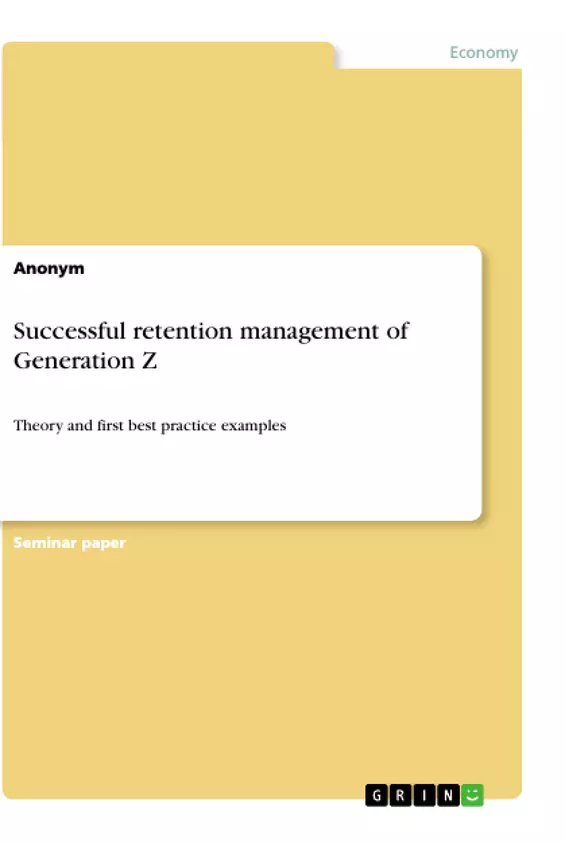This paper will deal with the question: What measures do companies take to retain Generation Z for long-term loyalty? After the previous chapter presented the extensive problem and the goal of this paper, the next section provides fundamental background information about the research topic.
The background information is sectioned in three key aspects. First of all, a basic understanding of employee retention management will be created of which measures can be implemented and which framework conditions should exist in the company for successful employee retention. This will later serve as a foundation when it comes to binding Generation Z to companies. In order to be able to place Generation Z in an overall context, the previous generations are first going to be defined. The overview of the four relevant generations illustrates how the generations were shaped by the time of their birth and how they partly differ from the other generations.
After a profound knowledge of Generation Z is acquired, the expectations and needs of this group must be determined next. Generation Z's expectations to the employer should provide initial insights into the measure’s companies need to take in order to retain the new generation in the long term. In the main section of this paper, the two companies Google and Daimler are used as pioneers for the retention of the new generation as best practice examples. Subsequently, these will be compared with the findings from the expectations of Generation Z and further recommendations will be formulated and defined. The summary at the end of the paper will conclude the answer to the stated research question and the way to go forward.
Inhaltsverzeichnis (Table of Contents)
- Introduction
- Problem definition
- Way of approach
- Background information
- Employee retention management
- Overview of the relevant generations
- Expectations of Generation Z
- Best practices to retain Generation Z
- Google LLC
- Daimler AG
- Further recommendations
- Summary
Zielsetzung und Themenschwerpunkte (Objectives and Key Themes)
This paper aims to examine the challenges of retaining Generation Z employees in today's labour market, particularly highlighting the demographic shifts and the shortage of skilled workers. It explores the specific expectations of Generation Z and analyzes best practice examples from companies like Google and Daimler, offering recommendations for successful retention strategies.
- Demographic changes and their impact on employee retention
- Shortage of skilled workers and its implications for companies
- Expectations of Generation Z employees
- Best practices for retaining Generation Z
- Recommendations for successful retention strategies
Zusammenfassung der Kapitel (Chapter Summaries)
The first chapter introduces the problem of retaining Generation Z employees in the context of demographic changes and the shortage of skilled workers. It outlines the importance of understanding and addressing the specific needs and expectations of this generation. Chapter two provides background information on employee retention management, discusses the characteristics and expectations of various generations in the workforce, and focuses on the particular demands of Generation Z. Chapter three explores best practice examples of companies like Google and Daimler that have successfully implemented strategies to attract and retain Generation Z employees, offering valuable insights into effective approaches. The paper concludes with a summary of key findings and recommendations for companies seeking to successfully manage the retention of Generation Z.
Schlüsselwörter (Keywords)
The paper focuses on key concepts such as Generation Z, employee retention, demographic changes, shortage of skilled workers, expectations, best practices, and retention strategies. It delves into specific examples of companies like Google and Daimler to illustrate effective approaches to managing Generation Z employees.
- Quote paper
- Anonym (Author), 2019, Successful retention management of Generation Z, Munich, GRIN Verlag, https://www.grin.com/document/900822




